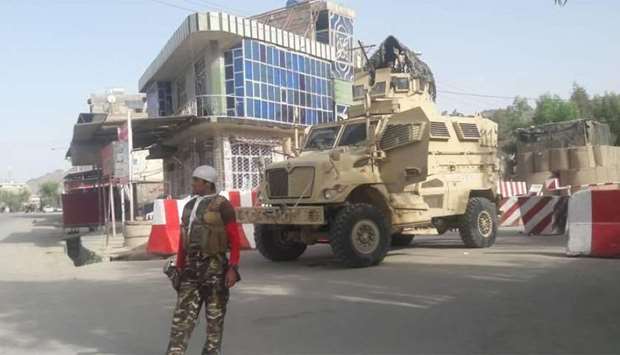US and Afghan aircraft Tuesday bombed Taliban positions in the western city of Farah after the insurgents launched a major attempt to capture the provincial capital, with fearful residents seeking shelter from explosions and gunfire.
The attack -- the first major assault targeting a city since the Taliban launched their annual spring offensive -- began around midnight, with the militants capturing one urban district and parts of another, said local provincial council member Jamila Amini.
‘Heavy fighting continues inside the city and aircraft have just started bombarding Taliban positions,’ she told AFP earlier Tuesday from inside Farah.
NATO's Resolute Support mission in Kabul tweeted that the Afghan army, supported by US airpower including A-10 Thunderbolts, was ‘on the offensive’ and the city ‘remains under govt. control’.
Interior ministry spokesman Najib Danish said the Afghan air force was also taking part in the fighting. ‘(The Taliban) will fail,’ he vowed.
Police special forces from Kandahar and commandos from Herat have also been deployed to the province which borders Iran, according to Afghan officials.
Defence ministry spokesman Mohammad Radmanish said at least 10 insurgents and two Afghan security force members had been killed so far.
Inside the city residents reported clashes were continuing. ‘The situation is very bad,’ Satar Hissaini, a tribal elder in Farah, told AFP.
‘Heavy fighting is going on and Taliban are in the city but the police headquarters and NDS (the Afghan intelligence agency) have not fallen to them,’ he said.
‘NDS forces in their HQ are engaged in heavy clashes with the Taliban.’
Another provincial council member, Dadullah Qani, confirmed Hissaini's comments. Gunfire and explosions could be heard as he spoke to an AFP reporter by telephone.
The noise has ‘filled the city’, said one resident who gave his name as Bilal, adding that he could see smoke rising from the direction of a building housing the NDS.
At least some militants have been hiding in private houses, making it difficult for Afghan forces to use heavy weapons, Farah governor Abdul Basir Salangi told Ariana News, adding: ‘But still we are taking back positions one by one.’
The insurgents in a statement warned residents to remain in their homes and ‘stay calm’. They have been posting images on social media which they claim shows them inside the city.
Many radio and television channels in the province have stopped broadcasting, fearing for their employees' lives, according to media watchdog Nai.
- Growing threat -
The Taliban are stepping up their spring offensive, in an apparent rejection of a peace talks overture from the government.
Farah is a poppy-growing province in an isolated region of Afghanistan. There are plans for a section of the multi-billion-dollar TAPI (Turkmenistan, Afghanistan, Pakistan and India) gas pipeline to traverse it, a project with which the Taliban have pledged to cooperate.
But it has been the scene of intense fighting in recent years. In 2017 insurgents tried three times to overrun the capital, according to the Afghanistan Analysts Network.
As such, Tuesday's offensive ‘should not have taken government forces off guard’, said military analyst and retired general Atiqullah Amarkhail.
Amarkhail added that ‘even ordinary citizens were aware of the Taliban gradually taking over more areas and becoming a formidable force in the province’.
He accused the government and military leadership of ‘turning a blind eye’ until the insurgents actually entered the city.
Afghan troops and police nationwide have struggled to hold back the resurgent Taliban since the withdrawal of most NATO combat forces at the end of 2014.
The insurgents have tried several times to take provincial capitals in recent years, including Kunduz and Lashkar Gah, with the Afghan army deploying significant numbers of troops to hold those cities and push the militants out.
Kunduz, Afghanistan's fifth largest city and capital of the northern province of the same name, fell briefly to the Taliban in 2015.
They along with the Islamic State group have also stepped up their attacks in the capital Kabul, which the UN says has in recent years become one of the country's deadliest places for civilians.

